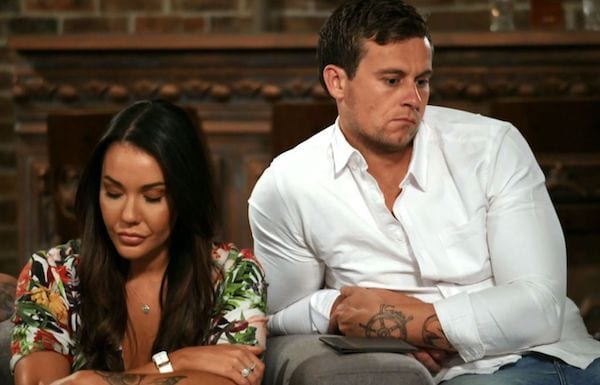So at first, Channel 9’s TV hit reality show of the season, Married at First Sight, passed me by.
It was my son Sam who changed that. He’s 23 and, like most young adults, has his own busy life so we’re rarely together in the evenings. A few weeks ago, however, he slid sheepishly onto the couch and asked if we could watch MAFS. I was surprised he wanted to, particularly with me, but as I’m always happy to share an activity with him, we flicked it on.
Well, it was a mind-blowing experience.
There’s a lot to say about MAFS and as anyone who watches knows, an enormous number of people are saying all of those things. On Twitter, Instagram and Facebook as well as in mainstream media and around every work water cooler, Australia has lit up in recent weeks with everybody discussing what’s happening on MAFS. Will Tracy stay with Dean? Will Patrick’s mum accept Charlene? Will Justin and Carly ever hold hands? Could Ryan roll his eyes any harder? And what’s with Troy’s crazy laugh?
My own growing interest in it has focused less on whether I care about these people’s “marriages”, and more on what can be learned from the show.
As a trained teacher, a passionate campaigner for women’s rights, and a parent of young adult children MAFS is, for me, the perfect opportunity to talk to my kids about understanding other humans. Because in their intimate relationships, their friendships and at work, my kids will be better equipped to cope with life if they recognise undesirable character traits in others and learn to manage or avoid them.
It sounds immodest if I say my home is a fairly happy place. Of course, there are disagreements with four strong-minded adults living here (myself, my husband and our twin sons), but it’s normally positive and supportive. I’m proud of that, but it means my kids haven’t really been exposed to overly manipulative, self-absorbed or wilfully cruel people. They have encountered such behaviours during their education and in their jobs, but when it’s are displayed in technicolour glory in their own loungeroom, they can learn much more.
For a long time, I’ve wished all Australian teenagers received lessons on respectful relationships at school. Teaching boys about respect for women, healthy relationships, enthusiastic consent and toxic masculinity, for example, would make much difference to their lives as men. And in a country where dozens of women are still murdered by their partners each year and thousands more injured or otherwise abused, teaching girls to recognise potentially controlling partners could improve their safety as adult women.
Such programs do exist around the country but they’re of varying quality and duration and in most places aren’t compulsory.
I honestly believe MAFS can fill in some of these gaps, particularly if accompanied by the right input from parents.
This is what happened for Sam and I. As the dramas played out onscreen, Sam and I would wait till the episode finished and talk. And talk, and talk. I’ve never discussed human behaviour or relationships with him as honestly before. He saw behaviour from women that he’ll recognise more easily should he encounter it in his own partners, and he saw behaviour from men that he now knows is unacceptable should he ever be with other men talking about women. So he’ll be able to both choose a better partner and BE a better partner as he grows older.
My daughter Laura doesn’t live at home but she and I have also talked about MAFS. We met up last week, for example, and were both agog at how Dean would flatly lie and continue to lie even when his lies and gaslighting were caught on film. During episodes we sometimes texted each other our opinions and ideas about what was happening. I don’t set out to educate her as she’s an independent woman but for her, too, I’m happy she’ll now be able to better recognise poor behaviour among her workmates and friends.
Of course, such learning may come at a price as reality shows are potentially damaging for those involved, and it makes me uncomfortable that Channel 9 may be making mega-profits from the contestants’ misery. A couple of participants (including Davina and Dean) have suffered extreme abuse (including horrendous gendered abuse aimed at Davina) and I wonder how their futures will be affected by that hate.
The opposing argument, though, is that they’re consenting adults and three previous seasons of MAFS would have shown them what could happen. Presumably, they think it’s worth it: they want to be “stars”, and who are the rest of us to say they can’t have their 15 minutes of fame? I’ve heard Davina has increased her Instagram following enormously during the series, and perhaps she thinks her portrayal has been worth it for that alone. She wouldn’t be the first to build a valuable career from an infamous beginning.
For those turning their noses up at MAFS, I get it. I also understand the contradictions and myriad potential problems associated with the show.
But on balance, I believe it’s been positive and beneficial for the youth of Australia, and for anyone who wants to learn more about human interaction and benefit from that knowledge in their own lives. And for Sam and I, in particular, it’s been amazing. We’re sorry to see it end.
Bye, bye, MAFS. Our evenings won’t be the same without you.


